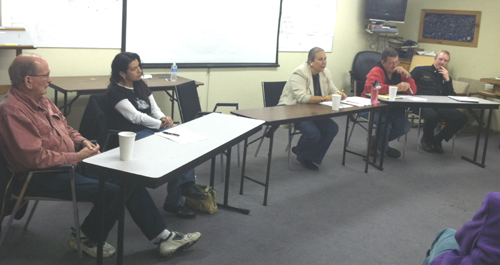Governor holds line on new spending: Anticipates revenue decline
“Things don’t last forever. The surging tide of revenue is beginning to turn as it always does,” said Gov. Jerry Brown at the news conference Friday, May 13, releasing his May revisions for the fiscal year 2016-17 budget proposal.
Brown’s statement, which began the conference, demonstrates his fears about the future, reflected in the current budget proposal.
“That’s very important and why we are preparing for a time of necessity,” he continued. “Deficit spending is on the horizon and that assumes no recession.”
The May revision revenue projection is $120 billion, which is $600 million less than the January budget proposal. Consequently, expenditures are planned to be $122.2 billion, $400 million less than January’s estimates. The Rainy Day Fund was reduced to $6.7 billion from the January forecast of $8 billion.
Since Brown became governor in 2011, the state’s $27 billion deficit has slowly been whittled down. But the horizon, which worries Brown, is not rosy. After fiscal year 2016-17, current projections indicate the state will have deficit spending through 2019-20 without the specter of any economic turndown.
While the budget projections through 2019-20 include the Proposition 30 tax increases, the deficit would widen if they are not extended in the November election. If they fail, Brown said, “We’ll manage with some cuts.”
When asked if he supported the extension, Brown repeated what he has said in recent months, “I leave it to the people of California. I said it was temporary when it passed.” His budget summary said, “Until the voters decide this important question, no significant new ongoing spending commitments should be made. The May revision reflects this principle.”
His lack of optimism is re-enforced when he related a budget report from Moody’s. To be ready for a recession or downturn, California is ranked 19 out of the 20 largest states.
“We can’t have any significant new spending and must get ready for the downturn,” he stressed. “There are no halcyon days ahead.”
In the midst of the budget despair, Brown stressed that his priorities have helped the needy, and he will continue their support. First, health insurance has been expanded for millions of Californians. Medi-Cal has grown from 8 million recipients to 13 million. A minimum-wage bill has passed, state education funding has been directed to students with the greatest need and the state now has an earned income tax credit. According to the press release, these initiatives have totaled more than $19 billion.
The Legislative Analyst’s Office’s initial response to the new budget proposal concurred with Brown’s recommendations. “Since January, the state has made several new ongoing budgetary commitments, some of which carry substantial ongoing costs for the state in future years. These changes, together with reduced estimates of revenues and reserves, mean there is now less capacity than there was in January to make additional budgetary commitments … Our office suggests the Legislature adopt a robust target for budget reserves for the end of 2016-17.”
The May revision does include a proposal to mitigate homelessness and help improve the affordability of housing, and endorses a Senate proposal to fund the construction of housing for the homeless using $2 billion of bonds backed by Proposition 63 income tax revenues.
The revision also includes some smaller increases for other programs such as drought resiliency. Another $11.4 million was added for tree removal. About $6 million is for grants to local entities and $5 million for Cal Fire equipment and overtime.
In response to Brown’s budget adjustments, state Sen. Jeff Stone issued a release stating, “I applaud the governor’s call for fiscal restraint and call on my Senate colleagues to continue to build California’s Rainy Day Reserve Fund and not to propose costly programs that spend taxpayer money we do not and will not have.”





